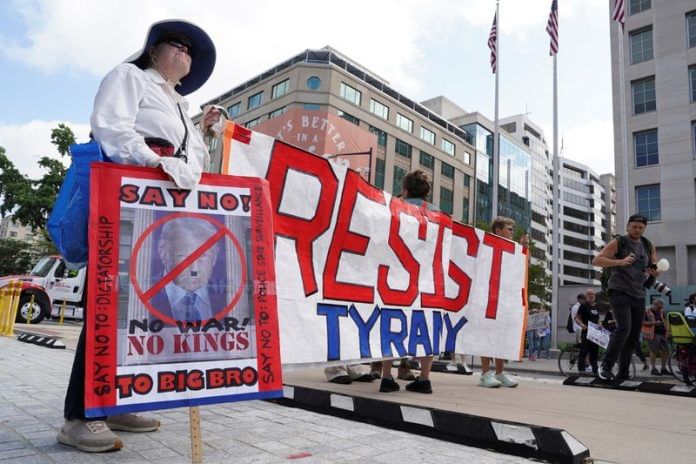By Jan Wolfe
(Reuters) -The District of Columbia’s attorney general sued Donald Trump on Friday in a bid to impede his attempted takeover of Washington’s police force, escalating a power struggle between the Republican U.S. president and the U.S. capital city’s Democratic leadership.
Here is an explanation of what federal law says about Trump’s authority over the District of Columbia.
WHO GOVERNS THE DISTRICT OF COLUMBIA?
The U.S. Congress has legislative authority over Washington, D.C., a federal district that is not part of a state. But Congress has historically delegated much of the day-to-day work of municipal government to local entities.
A 1973 law called the Home Rule Act allows D.C. residents to elect a mayor and city council. Congress controls the city’s budget, and it can nullify laws passed by the city council.
WHO CONTROLS D.C. LAW ENFORCEMENT?
The Democratic mayor of Washington, Muriel Bowser, has authority over the city’s Metropolitan Police Department. But a provision of the Home Rule Act, called Section 740, allows the president to take control of the police department for 30 days during an emergency.
Trump invoked Section 740 on Monday, saying in an executive order that there is a “crime emergency” in the city.
Bowser has pushed back on Trump’s claims of unchecked violence. Violent crime hit its lowest level in more than three decades last year, according to city data, and has continued to decline this year.
CAN TRUMP EXTEND POLICE CONTROL BEYOND 30 DAYS?
Trump on Wednesday suggested that he could extend the 30-day federal takeover of D.C. police without congressional approval.
“If it’s a national emergency, we can do it without Congress, but we expect to be before Congress very quickly,” Trump said.
Legal experts said the law is clear: A presidential takeover is limited to 30 days unless Congress votes to extend it through a joint resolution. Any such legislation would likely fail in the Senate, where Democrats can use procedural rules to block most bills.
ARE THERE LIMITS TO TRUMP’S POWER OVER D.C. POLICE?
Trump’s Justice Department asserts that Section 740 allows for a broad presidential takeover of the Metropolitan Police Department. U.S. Attorney General Pam Bondi has issued policy directives for the force, and on Thursday named Drug Enforcement Administration chief Terry Cole as the department’s “emergency police commissioner.”
In Friday’s lawsuit, D.C. Attorney General Brian Schwalb, a Democrat, asserted that Section 740 was a “limited grant of authority” to the president. Even if a president declares an emergency, local officials retain the power to dictate Washington police policies and chain of command, according to the lawsuit.
U.S. District Judge Ana Reyes, who is hearing the case, has so far been skeptical of Trump’s view that Section 740 allows for a total presidential takeover of the city’s police. But this is the first time the issue has been litigated.
WHAT ABOUT THE NATIONAL GUARD AND FEDERAL AGENTS?
Trump has broad control over the D.C. National Guard’s 2,700 soldiers and airmen. They report directly to the president, unlike their counterparts in other states and territories. Unlike the D.C. National Guard, each state’s National Guard serves as a militia force that answers to their governors except when called into federal service.
Trump said on Monday he was deploying 800 National Guard troops to Washington.
Trump in recent months has also directed federal law enforcement agencies such as the FBI to increase police presence in Washington. Trump has broad authority to reallocate federal agency personnel.
CAN TRUMP’S D.C. ACTIONS SERVE AS A MODEL FOR OTHER CITIES?
Trump has said the federalization of Washington’s police force could serve as a model for similar action in other U.S. cities. Trump has previously said he would expand his efforts to other Democratic-run cities such as Chicago that he claims have failed to address crime.
But Washington is unique because of the District of Columbia’s legal status and the Home Rule Act.
There is no similar legal authority that Trump can cite to take over police departments in other cities. The U.S. Constitution’s 10th Amendment vests in states a police power to provide for the health, safety and welfare of state residents.
Trump could decide to send the National Guard or other military forces to support law enforcement in other cities, as he did when he sent 4,000 National Guard troops to Los Angeles amid protests against his administration’s aggressive immigration raids. There has been a longstanding tradition against using the military to police civilians within the United States.
California’s governor has sued Trump, arguing that the president improperly called the state’s National Guard into service and violated an 1878 U.S. law that generally prevents the military from engaging in domestic law enforcement. Trump said the National Guard presence was justified because protests and acts of violence in Los Angeles were “a form of rebellion” that necessitated a military response.
A judge heard testimony this week in the California lawsuit, which seeks a ruling that would return the National Guard troops to state control and a declaration that Trump’s action was illegal.
(Reporting by Jan Wolfe in Washington; Additional reporting by Dietrich Knauth; Editing by Noeleen Walder, Will Dunham, Rod Nickel and Lincoln Feast)
Disclaimer: This report is auto generated from the Reuters news service. ThePrint holds no responsibility for its content.




